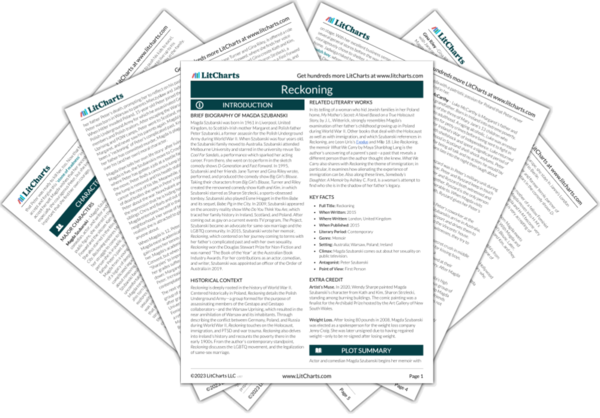Much of Reckoning deals with the uncovering of brutal history and tales of suffering. Both the Holocaust and Ireland’s history of war and poverty are inextricable from Magda’s family history. Whether she is hearing the story of a murdered Jewish child, learning that 10 of her Irish great-grandmother’s children died from poverty and disease, or touring the ruins of extermination camps in Poland, Magda encounters truths the horrors that push her beyond the scope of what the human mind can endure. In family members who experienced these horrors directly, Magda sees two modes of coping: some succumb to tears, while others, like Peter, assume a cold and objective perspective. Magda goes back and forth between these two extremes, alternatively giving in to floods of grief and becoming stoically indifferent to the trauma of her family’s past. But while the former reaction feels indulgent to Magda, she finds that the latter feels heartless. Not only does Magda question which reaction is more appropriate, but she also wonders which is more useful. Ultimately, Magda alternates freely between the two reactions, understanding that indifference is necessary in that it protects a person from terrible truths and allows them to survive horrific situations, while those who suffered through great atrocities—and those who remember them—deserve the right to grieve. In this way, Magda settles her struggle between indifference and feeling when she realizes that both reactions are equally valid ways to cope with unbearable pain.
Indifference vs. Feeling ThemeTracker

Indifference vs. Feeling Quotes in Reckoning
Chapter 2: Death of an Assassin Quotes
We were tugboats in the river of history, my father and I, pulling in opposite directions. He needed to forget. I need to remember. For him, only the present moment would set him free. For me, the key lies buried in the past. The only way forward is back.
Chapter 21: Warsaw Quotes
Now I would say it was survivor’s guilt. By a fluke my father had made it out of Poland and so his children had been spared all of this. I wanted to make it up to my Polish family for all they had suffered. But how? There was no plan. And no relief.
Chapter 25: Shadow in the Amber Quotes
He was reproaching her—for what? Her weakness?—and he was recasting her response as self-indulgent. A useless thing that was no help to anyone.
As a man his job was not to feel. It was to act, to do something. Maybe Izabella’s father was right—feelings are what get people killed.
But dear God, if you cannot weep at Auschwitz?
I was thirty-one years old. I was a brave Pole. I felt the expectation to man up, and my emotions fell into step with my father’s. They floated off like vapor. I felt, at that moment, nothing except irritation with my mother’s weakness.
Chapter 29: Home Movies Quotes
[Peter] squints into the distance as though he might find…what? Answers? Justice? Wisdom?
‘How would I react?’ he asks straight at the camera. ‘You see you don’t know your reaction until you are actually there, until you are confronted with the circumstances. There were people swearing what they wouldn’t do. And when it came to the crunch…they bloody well did it.’
Chapter 33: Molotov Cocktails Quotes
My father knew that even in his war, a just war where Hitler had to be stopped, the balance of good and evil was no simple thing.
[…]
‘I was good at it. Good at organizing the aktions.’ And there it was. The bastard emotion. Hard, shining, gleaming pride.
Was it the stone of madness? His pride in his efficiency as a killer? It seemed he was simultaneously proud and ashamed of what he had done. Maybe that was what he couldn’t forgive himself for.
Chapter 37: Ireland Quotes
Was this the gift of my Irish inheritance—the ability to survive loss but at the cost of loving easily? […] when I began to sob uncontrollably—inexplicably—it was for my family. For my parents, my grandparents, my great-grandparents and beyond. And for Mary Jane’s ten nameless children buried in the cold Irish earth. And maybe also for myself. Because I wondered, in that moment, if this was why I have never had children of my own.
Was I too soft, too privileged? Yet again I was unsure which was the mad response—feeling or not feeling. And which response was more useful—mindfulness or denial.
Chapter 41: Trepanning Quotes
[Peter] was trying to cure me of weakness. In order to help me survive he thought he needed to expunge normal human frailty. […] He tried to make us strong like him because if we succumbed there was only one possible course of action. He would have to do his duty. He would have to kill us.
He was toughening me up so that he wouldn’t have to kill me.
This, then, is the stone of his madness.











